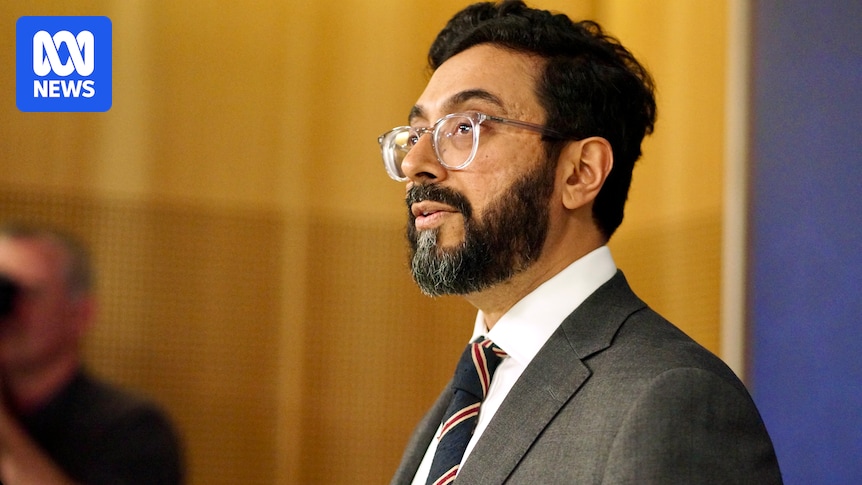The push to outlaw religious discrimination should be revived and counter-terrorism laws should be reviewed, according to a landmark report by Australia’s first ever Islamophobia envoy.
Aftab Mailk, who was appointed to the newly-created role last year, delivered his 54 recommendations on Friday, including calls for twin inquiries into the prevalence of Islamophobia and anti-Palestinian racism.
“The reality is that Islamophobia in Australia has been persistent, at times ignored and at other times denied, but never fully addressed,” Mr Malik told reporters.
“These recommendations aim to engender a fair, respectful and inclusive environment, one that actively combats prejudice and hate, but importantly respects fundamental freedoms.”
Albanese position unchanged on religious discrimination
Attempts to legislate protections for religious belief, similar to those that already exist for race, gender and sexuality, have failed in each of the last two parliaments.
Religious discrimination legislation abandoned
Last term, Prime Minister Anthony Albanese refused to publish a draft bill because he could not secure the Coalition’s support, saying at the time he did not want a debate likely to inflame community tension.
Appearing alongside Mr Malik on Friday, Mr Albanese said this remained his position.
“I certainly support religious discrimination legislation, but I don’t support starting a debate that leads to rancour … I’m certainly willing to engage, as I have always been.”
Mr Albanese said his government would consider all of Mr Malik’s recommendations but emphasised they were made independently, the same approach he took to a report from anti-Semitism envoy Jillian Segal in July.
Report identifies persistent Islamophobia
The envoy’s report identified persistent Islamophobic attitudes and incidents of hatred towards Australian Muslims, which it dated back to the September 11 terrorist attack on in 2001.
A study in the following decade found half of Australians self-identified as being “anti-Muslim”, a prevalence that has persisted in more recent studies, including a 2024 Scanlon Institute survey which found more than one-third express negative attitudes.
Mr Malik said Muslim women who wear hijabs were subject to particularly horrific abuse given their visible religious identification. “[They] have had their hijabs pulled and ripped off. They have been subjected to foul, disgusting and degrading behaviour,” he said.
He cited two instances of bomb threats at a mosque and an Islamic school in the last week alone, and said his community consultation indicated that Islamophobic incidents were under-reported, with harassment and death threats commonplace.
The recommended national inquiry into Islamophobia would assess the contributors to the prevalence of hate, including the contribution of government policies and media coverage. It would also seek to understand the impact on Muslim communities.
A separate anti-Palestinian and anti-Arab racism inquiry would have a particular emphasis on the fallout to the Gaza war.
Mr Malik said the “hellish suffering inflicted upon the people of Gaza” was associated with “dehumanisation” of Palestinian-Australians but added he was “wary of using Islamophobia as a proxy for, or to conflate it with, [this] racism”.
He also recommended an independent inquiry into the effect of counter-terrorism laws and approaches on Muslim communities, echoing a recommendation of the Australian Human Rights Commission.
Also in line with that commission, Mr Malik said racial discrimination laws should be clarified to explicitly state that they cover the “ethno-religious” Hindu, Buddhist, and Muslim communities as they already do the Jewish and Sikh communities.
Other recommendations include more security support for Islamic facilities, grants for community and artistic projects to promote social cohesion and fight Islamophobia, and better reflection of Islamic history and culture in the school curriculum.
In particular, he highlighted the history of interactions between Aboriginal and Torres Strait Islander people and Muslims, including Macassan traders from Indonesia and 18th-century cameleers.
“This history of material, social, and spiritual exchange echoes in the present, creating space for enduring respect, generosity, and openness.”
Usman Khawaja details racist incident at Boxing Day Test
The report’s foreword was written by cricketer and prominent Australian Muslim Usman Khawaja, who welcomed the recommendations.
“[They] are not punitive; they seek to work with people, respect free speech and engender coming to know Muslims better, rather than placing penalties and monitoring people’s actions and words,” he wrote.
Usman Khawaja, who recently visited Parliament House, provided the foreword to the report. (ABC News: Callum Flinn)
Mr Khawaja detailed stories of his own family’s experience of Islamophobia, including an instance of two men “screaming obscenities” at his mother when she had come to watch him play in Melbourne’s Boxing Day Test.
The report concluded with several Muslim community leaders endorsing the recommendations.
Bilal Rauf of the Australian National Imams Council said the recommendations “must be taken seriously, and confronting Islamophobia must be treated with the same urgency as other forms of racism and prejudice”.
Muslim groups support Islamophobia report
Dr Nora Amath of the Islamophobia Register Australia said the report was “a much-needed step towards addressing the pressing issue of Islamophobia in Australia” and the recommendations were “well-considered, practical, and actionable”.
Anthony Albanese did not indicate a timeline for responding to the recommendations but welcomed the review and said he was determined to nurture social cohesion.
“At a time when there’s conflict in the world, I really see that Australia can be a microcosm of what we want the world to be, a place where people live side-by-side in harmony,” he said.

